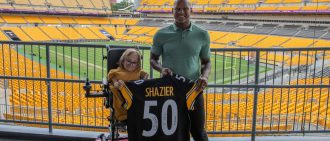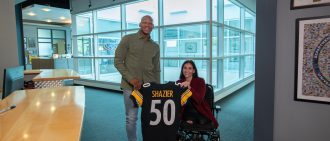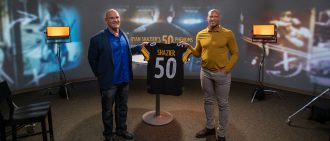Monique Marion says she falls a lot. It’s a reality of her situation, having undergone an above-the-knee amputation on her right leg after complications from a knee injury.
But every time Monique falls, she knows just what to do.
“I just get back up,” she says.
“I ask for no help. I can do it. I’m only human. People fall. I fall a lot, but I get back up and I keep walking.”
Since her original injury in 2017, Monique has faced many different challenges and pitfalls. But each time, she has gotten back up and found the best solution to move forward.
When her weight made her recovery difficult, Monique had bariatric surgery — she now weighs about half of what she once did. And when she needed other surgical procedures to fix medical conditions that cropped up, she got the care she needed.
Several years post-injury, Monique continues to move forward. And one thing she’s learned is the importance of picking yourself up after each setback.
“The worst part is losing your leg,” she says. “The good part is that I’m up now, I’m moving forward, and I’m not going to give up. I have a daughter. That’s my journey. My journey is to stay focused, live life, and enjoy it.”
Ryan Shazier's 50 Phenoms Season 4
‘My Whole Life Is Changing’
A New York native, Monique moved to Pittsburgh for work. She was a counselor and was working with adults who have special needs. Part of her job involved accompanying them to jobs that fit their skill sets.
In June 2017, Monique and her clients had just finished a cleaning job and were bringing the equipment outside. There was a hill, and Monique noticed one of her clients was holding a large piece of equipment and looked like he might fall.
“I thought he was going to fall down the hill, so I ran and secured him,” she says.
When she did that, her own equipment began to roll away. And when she went to retrieve her equipment, her right knee buckled and she fell.
After her injury, Monique saw a doctor who told her to rest it for a few days. But a few days passed, and she was still in pain.
At that point, she went to UPMC East to see what was happening.
“They would just ask me a whole bunch of questions,” she says. “Like, what happened? Can you wiggle your toes? And I’m like, trying to wiggle my toes, not knowing I couldn’t.”
The care team at UPMC East took scans of Monique’s leg. They discovered that she’d dislocated her right knee, and a clot had formed that was preventing blood flow to her lower leg. She needed to transfer to UPMC Presbyterian by helicopter for further care. “That was a freakout right there,” she recalls.
Monique underwent surgery, but her condition still wasn’t improving. She was receiving round-the-clock care, with her team trying to save her leg.
“It was just scary,” she says. “I was so scared. I tried to be strong. I didn’t want anybody to see my fear. But some days, I just broke down.”
Eventually, her doctor came to her with a choice: The team could continue to try to save her leg, or they could perform an above-the-knee amputation. She asked everyone to leave the room as she considered her options.
“I blocked everybody out,” she says. “I didn’t ask anybody what I should do. I thought to myself, with the odds, why should I work on the bad leg when it might not get better, and then something else goes wrong with my body?
“Everything was running through my mind. I just thought, my whole life is changing. It’s going to change.”
Ultimately, Monique told her doctor to go through with the amputation.
“I made that choice, and I don’t regret it,” she says. “Once I woke up and realized they took my leg, I wasn’t upset. I had to keep thinking in my mind, like, this is for the best. At least I would be able to get up and walk again.”
Never Miss a Beat!
Join the email list and receive updates for Ryan Shazier's 50 Phenoms.
Thank you for subscribing!
You can now select the specific newsletters you'd like to receive.
You are already subscribed.
Subscribe to more newsletters in our email preference center.
Sorry, an error occurred. Please try again later.
Get Healthy Tips Sent to Your Phone!
‘She Wanted to Tackle the Challenges’
After her amputation procedure, Monique moved to UPMC Montefiore to begin her rehabilitation. She did not yet have her prosthetic, but her care team got her started on rehab right away.
Amputation patients often face a difficult rehabilitation process from a physical and emotional standpoint. They have to deal with the permanent loss of a limb. They may also have to deal with physical pain, learn how to use a prosthesis, and relearn how to walk and perform other routine tasks.
“Most patients haven’t thought about walking since they were toddlers,” says Michael Munin, MD, director of the Prosthetic Rehabilitation Clinic at UPMC Presbyterian.
“I liken it to the analogy of learning how to play a sport. If you’re learning how to play a new sport, you couldn’t just come on the field day one without knowing how to hold the ball, how to swing the bat, how to put on a mitt, how to hold your hands and watch the ball come into your chest. All these little subskills have to be learned first before you come out to the ballfield and play an organized game or sport. Rehabilitation after limb loss is a similar process.”
Despite the challenges Monique faced, Dr. Munin says she was motivated.
“She wanted to tackle the challenges that were ahead of her,” he says. “She was always looking forward to maximize her independence and not let the injury define her life. Monique used her motivation for living to define how she was going to succeed in the rehab process.”
She began physical and occupational therapy at UPMC Montefiore, learning how to use her new body.
“They had me up and popping and doing all types of things,” she says. “They wanted you to do what you were supposed to do to get yourself back on the road. I loved them.
“They taught me how to go inside the bathroom, how to get on the commode. They had me balancing, working on my strength, getting my endurance together.”
‘I Had to Lose It’
Monique spent about two months at UPMC Montefiore for rehab before returning home. Soon after that, she received her prosthetic leg and continued her rehab at a UPMC Rehabilitation Institute outpatient location.
Although she was continuing her therapy, Monique found that her weight was making it difficult. At the time, she weighed over 300 pounds. The weight was putting extra pressure on her prosthetic limb. She was having a hard time moving around and was getting frustrated.
“When I went [to therapy], I was so angry because the things that they were asking me to do, it was so hard for me to do because of my weight,” Monique says. “I had to say to myself, ‘Why am I being mean to them when they’re here to help me?’ So I had to really realize, they’re here to help me.”
After a while, Monique realized she would need to make another tough choice. Because of the challenges her weight was causing in her rehab, she decided to undergo bariatric surgery.
“I had to lose it, or I wouldn’t be able to get up and walk,” she says.
Monique underwent her bariatric surgery in November 2019. The procedure shrank the size of her stomach, making it easier for her to cut portion sizes.
But Monique also had to commit to a different lifestyle. She began to eat and drink healthier options. She also continued her physical therapy.
As time went on, Monique’s weight dropped. She lost about 150 pounds from her heaviest days. She can move around with much more ease now.
“Do I feel good?” she asks. “No — I feel fantastic.”
‘I’m Blessed to Still Be Here’
About six years have passed since the injury that changed Monique’s life in so many ways. She continues to make progress every day.
Monique now is on her third prosthetic leg, having needed smaller sizes after her bariatric surgery. She can walk without the use of a cane or crutch. She can also drive because she has modified her car to allow her to use her left leg instead of her right. She enjoys traveling and hopes to do more of it.
“People living with above-the-knee amputation have a significant injury and a permanent loss of body, but with the proper rehabilitation, many patients can do well,” Dr. Munin says. “Limb loss can have happier endings, even with a catastrophic injury that she suffered. She’s done so well with the process, and she’s really exceeded most of our goals.”
From a physical standpoint, Monique also feels much better. After her bariatric surgery, she had further procedures on her hip and on her thumbs.
She stays active, going to the gym on a regular basis. There, she boxes, takes Zumba classes, uses the treadmill, and works on her muscles. She also bought what she calls an “adult tricycle” last year and has been “riding it ever since.”
There are still steps Monique wants to take. Before her injury, Monique used to play tennis with her daughter, who is in her early 20s. She hopes they can do it again.
The experience of the past six years has strengthened Monique’s relationship with her family. She says they helped her through her most difficult days.
Those difficult days still come sometimes. Monique continues to face some challenges. She sometimes feels phantom pain and other sensations in her right leg, even though it’s not there.
But she faces those challenges with a positive attitude.
“She has a very sweet and gentle disposition,” Dr. Munin says. “She’s always happy to see you, always has a smile. And, if she’s in pain or discomfort, even when she’s really uncomfortable, she’s still trying to be pleasant and happy. And so, I just think she’s a very warm person who enjoys other people’s company. She’s the kind of person you root for.”
Monique shares her positivity with other people she meets who are going through adversity. She describes herself as a “social butterfly,” and she makes a point to talk to other people and share her story.
“I’m blessed to still be here,” she says. “I’m blessed to give other people inspiration about: Don’t give up. You know, you’re not the only one. There’s other people that’s going through the same thing you’re going through. I’m trying to give them that extra energy to let them know: Don’t give up.”
Editor's Note: This video was originally published on , and was last reviewed on .
About UPMC Rehabilitation Institute
The UPMC Rehabilitation Institute offers inpatient, outpatient, and transitional rehabilitation, as well as outpatient physician services so that care is available to meet the needs of our patients at each phase of the recovery process. Renowned physiatrists from the University of Pittsburgh Department of Physical Medicine and Rehabilitation, as well as highly trained physical, occupational, and speech therapists, provide individualized care in 12 inpatient units within acute care hospitals and over 80 outpatient locations close to home and work.







